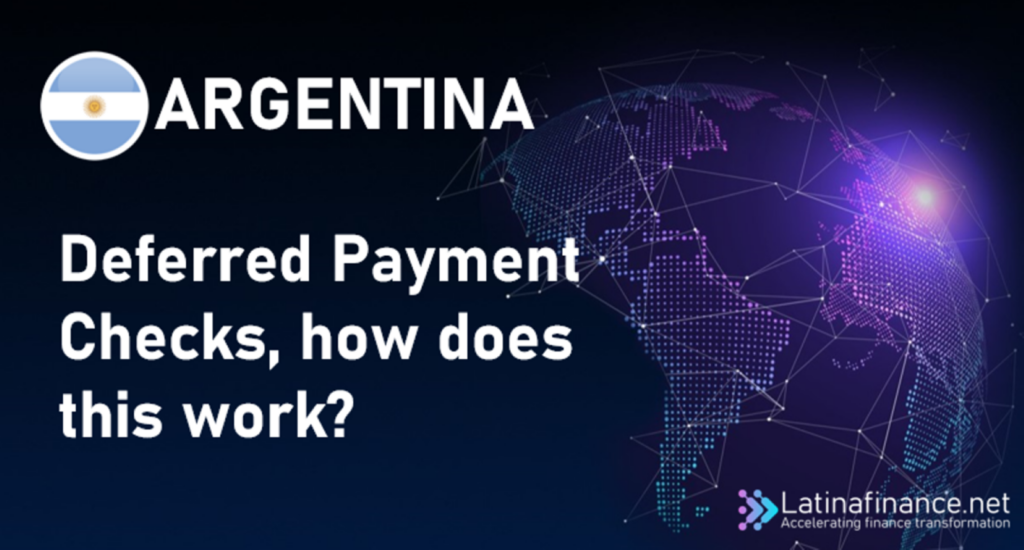
Deferred check is a singularity of the Argentine payment environment
Deferred Payment Checks (CPD, Cheque de Pago Diferido) is a relatively common instrument for companies to finance themselves for their short-term needs.
The concept is issuing a check with a nominal amount, incorporating pre-agreed payment deadlines up until maturity. Such payment amounts increase with time. It is a negotiable instrument on the MAV (Mercado Argentino de Valores), an organised and regulates financial market.
There are three types of checks, the Common, the Cancellation and the Deferred one.
Common checks are the ones that we all know, payable from the day they are issued and have thirty days to be presented.
Cancellation check used to secure an obligation for payment. It is solely used for the payment of real estate transactions. Unlike other types of checks, cancellation checks are issued by the Central Bank (which delivers them to banks on consignment as the entities register public orders). They are valid for 30 calendar days from the date appearing on the document and can have up to two endorsements. They can be issued in pesos or dollars.
Deferred check are those issued on one date but can be presented for collection later. In this case, there is also a maximum period of thirty days for its presentation, counting from the expiration date set by the person who issued the check.
More background and technical details
The inception of the Deferred Payment Check market traces back to the year 1995 when Law 24,452, commonly referred to as the Check Law, was enacted on February 8, 1995, and promulgated on February 22 of the same year. This legislative framework marked a pivotal moment by categorizing checks into two distinct types: common checks and deferred payment checks. The noteworthy aspect of this law lies in its provision that deferred payment checks are permissible for deposit in the MAV. Despite not being widely recognized among the public, MAV plays a fundamental role in the Argentine capital market. It stands as the exclusive entity authorized to receive deposits and safeguard negotiable securities.
This unique attribute holds significant implications for the financial landscape as it introduces a novel dimension to the market. Specifically, the allowance for the deposition of deferred payment checks in the MAV opens avenues to an entirely unprecedented market segment. Consequently, these financial instruments become eligible for negotiation within the Argentine capital market, thereby extending access to financing opportunities for medium and small-scale enterprises.
According to the stipulations of this legislation, the deferred payment check is delineated as an order of payment that, at the time of its issuance, bears a pre-determined payment date. This regulatory framework not only established a differentiated category of financial instruments but also laid the groundwork for facilitating broader financial inclusivity by integrating medium and small enterprises into the dynamics of capital markets.
What needs to be mentioned in the deferred check?

- The name “deferred payment check” must be written somewhere as well as the amount and the reference number of the check.
- Place and date of creation of the cheque with a maximum tenor of 365 days.
- There should also be the name of the drawee and the drawer with their respective signatures address and IRS numbers as well as the name of the beneficiary.
Upon issuance of the check, it is negotiated for a value less than its nominal value, which results in an implicit interest rate between the price at which the check was negotiated at the time of its issuance, and the nominal value, which is what will be paid at maturity.
Is it a risky means of payment?
When issued, the check becomes a negotiable financial instrument on the MAV. It can be issued either (a) clean without guarantee or with two forms of support, (b)one is a surety from an independent risk fund (called SGR, Sociedades de Garantía Recíproca) or (c) a direct guarantee from the MAV.
In both cases, the surety or the guarantor will entirely cover any payment default of the issuer.From an investor’s standpoint, if he invests in Deferred Checks covered by SGR, he will not even see the name of the issuer but only SGR. So yes it can be considered as a safe local financial instrument given its short term maturity too.
While deferred checks are still used, their digital version “Echeq” has been very successful since their creation by the central bank in 2019. Corporates can directly issue and trade the Echeqs on their banking platform at a reduced cost than traditional physical checks. We will make a special article on Echeqs.
it is important to mention too that deferred checks are also subject to the financial transaction tax of 0.6% levied on current account debits and credits.
Florent Michel